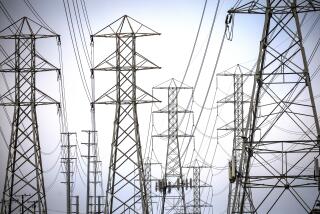Utilities Study May Be Model for Nation
- Share via
In what could become a prototype for such efforts nationwide, Ventura officials announced plans Friday for a study on ways to reduce water, gas and power use by four of the city’s largest utility customers.
Funded with a mixture of public and private money, the $50,000 study will examine plumbing and wiring at the Pepsi-Cola Bottling Co., the Doubletree Hotel, Ventura County Medical Center and Ventura Coastal Corp. juice plant.
The study engineers then will recommend ways those sites can make their equipment more efficient and recover the cost of the modifications through energy savings within two years, said Llana Sherman, Ventura’s water conservation coordinator.
The U.S. Environmental Protection Agency is interested in results of the groundbreaking study, which will be the model for similar studies in other California cities, said Charlie Pike, a spokesman for the state Department of Water Resources.
“It’s definitely the first of its kind in the state,” Pike said of the study. “This will set precedents for other sites and locations.”
On Monday, the City Council is expected to approve spending $10,000 on the 60-day study. In addition, $20,000 will be paid by the state Department of Water Resources and $10,000 each by Southern California Edison and the Southern California Gas Co.
Pike said that modifying equipment such as water heaters can save water, electricity and gas simultaneously.
And Roy Rawlings, vice president of Southern California Gas, said that utility is interested in developing such programs, which he said can result in “double conservation.”
Officials at all four study sites say they already have taken steps to conserve water.
Some also began conserving gas and electricity recently by altering equipment ranging from boilers to air conditioners.
But the officials said they are eager for the study to show them what more they can do.
“We spent, last year, $365,000 on utilities,” said Jerry Tononi, general manager of the Doubletree Hotel on Harbor Boulevard.
But Tononi said that--even with an in-house power plant that generates electricity and heats water, an energy system that turns on air conditioning only as it is needed and the practice of recycling “just about everything we can to keep our trash costs down”--the hotel can save more.
He said suggestions for improvements will be passed on to other Doubletree hotels.
Last year, the Ventura County Medical Center spent $100,410 on water, $197,000 on gas and $772,200 on electricity for the hospital and the county departments of public health, mental health and the coroner’s office, officials there said.
The hospital has replaced its toilets with low-volume models, installed three-gallon-per-minute shower heads and made plans to replace air-conditioning equipment with more efficient models, said Jim Penny, chief of facilities maintenance.
But more can be learned from the study, he said.
“There’s such a wealth of knowledge there, it’s only going to make our job easier,” Penny said.
The Ventura Coastal Corp. on Vista Del Mar Drive has reduced by 50% the amount of water it uses in extracting juice from fruit and packaging it, said plant manager Mike Stuebing. He would not describe the company’s conservation measures, saying, “I don’t want our competitors to know about it.” But he added, “We’ve made major strides.”
And even though the Pepsi-Cola Bottling Co. on Ventura Avenue refined its plumbing to cut its water consumption by up to 17% in recent months, the plant can do more to conserve water, power and gas, said manager Bruce McDowell.
Working informally with the utilities and the city, the plant has identified 18 changes it can make--from installing more efficient boilers to recycling water used in its soda pumps--to save energy, he said.
McDowell said he hopes that the study will show Pepsi how to make its equipment more efficient.
Sherman said she believes that the promise of energy savings will persuade these utility customers to make changes the study recommends.
“They would never take the time to go out there and analyze it themselves because it’s always been cheaper to use the water and waste the water than make these changes,” she said. “What we’re saying is, ‘We’re going to help you become as efficient as you can become.’ ”
More to Read
Sign up for Essential California
The most important California stories and recommendations in your inbox every morning.
You may occasionally receive promotional content from the Los Angeles Times.













